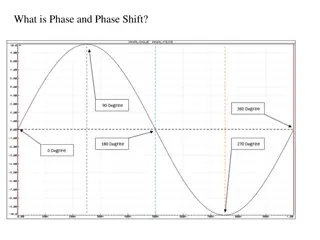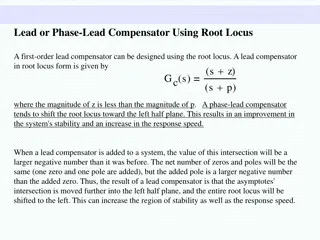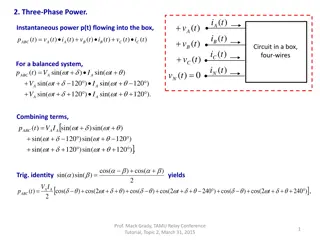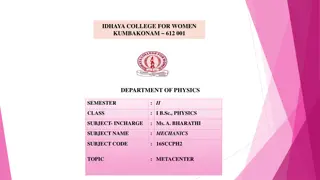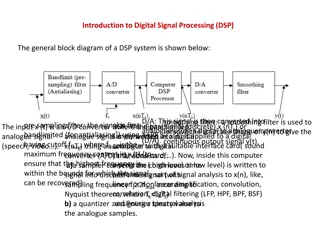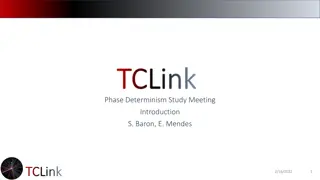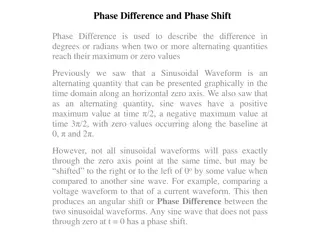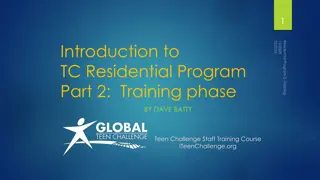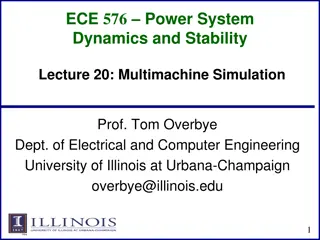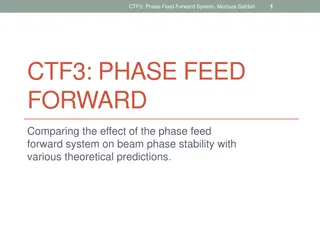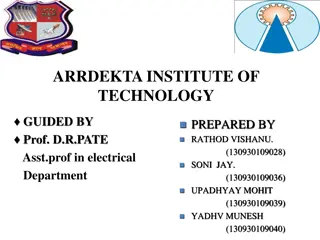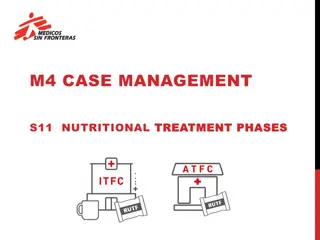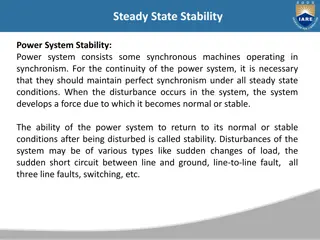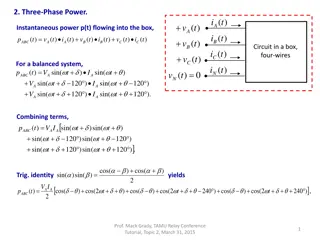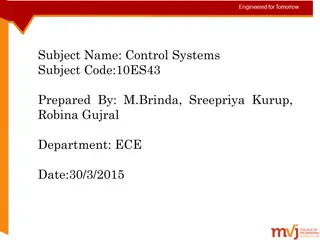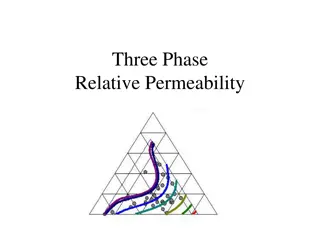Hungarian Banking System Stability Report May 2023
The Financial Stability Report for May 2023 of the Hungarian banking system highlights the resilience of banks despite international failures. The report discusses indicators of financial stability, risks faced by banks, and the sector's robust capital position. There are insights on private sector
5 views • 32 slides
How Do I Troubleshoot The BMW Stability Control Warning Light
Go through this presentation to find out why your BMW's stability control warning behaves strangely and how to fix it. Learn about the function of stability control and common causes of warning light activation, from low tire pressure to sensor issues. Follow troubleshooting tips and prioritize safe
3 views • 14 slides
Understanding Nuclear Structure and Forces in Physical Science
Explore the fascinating world of nuclear structure and reactions within atoms, delving into concepts such as nuclear force, binding energy, mass defect, and nuclear stability. Discover the intricacies of nucleons, neutron stars, and the Band of Stability, along with magic numbers that contribute to
6 views • 9 slides
Understanding RC Phase Shift Oscillators
Dive into the world of RC phase shift oscillators, exploring the concepts of phase and phase shift in electronic circuits. Learn how cascading RC networks can achieve specific phase shifts, the role of impedance, and the practical applications of RC feedback networks in oscillator circuits. Discover
0 views • 18 slides
Understanding Basic Meteorology Concepts for Air Quality Management
Pollutants circulate in the troposphere following air movement patterns around low-pressure fronts and high-pressure systems. Anticyclones and cyclones play a crucial role in atmospheric stability and pollutant dispersion. The relationship between lapse rates determines air stability and pollutant d
0 views • 24 slides
Understanding Lead and Phase-Lead Compensators
Lead and Phase-Lead compensators play a crucial role in improving system stability and response speed. By using the root locus and frequency response methods, these compensators shift the root locus toward the left half-plane, adding positive phase over the frequency range. This leads to increased s
0 views • 16 slides
Understanding the Three Stages of Project Life Cycle
The project life cycle consists of three key stages: pre-investment phase, construction phase, and normalisation phase. The pre-investment phase involves objective formulation, demand forecasting, and cost-benefit analysis. The construction phase focuses on building project infrastructure and invest
1 views • 5 slides
Understanding Three-Phase Power Systems and Instantaneous Power Flow
This detailed content delves into three-phase power systems, analyzing instantaneous power flow, balanced circuits, and trigonometric calculations. It explores the concept of constant three-phase power and provides insights into the analogy of a piston engine with infinite cylinders. The data includ
2 views • 9 slides
Understanding Phase Equilibria in Physical Pharmacy
Delve into the complexities of states of matter, phase equilibria, and the phase rule as explained by Assistant Prof. Dr. Fouad Al-saady in the context of physical pharmacy. Learn about phase definitions, phases in different systems, and examples illustrating phase differentiation in various substan
0 views • 22 slides
Phase 1 Phonics: Developing Early Listening and Speaking Skills
Phase 1 Phonics, the initial stage of Letters and Sounds, focuses on enhancing children's speaking and listening abilities to prepare them for phonics work in Phase 2. This phase emphasizes tuning in to sounds, listening and remembering sounds, and talking about sounds through various activities des
3 views • 17 slides
Understanding Metacentre and Metacentric Height in Fluid Mechanics
Exploring the concept of metacentre in fluid mechanics, where it is the theoretical point that determines the stability of floating bodies. The metacentric height (GM) is crucial in assessing the initial static stability of a floating object. Learn how the metacentre is defined and its significance
0 views • 15 slides
Understanding Poly Phase Induction Motor Construction
An induction motor is comprised of a stator and rotor, with the stator featuring a 3-phase winding fed from a 3-phase supply. The rotor comes in two types - squirrel-cage and phase wound. The squirrel-cage rotor consists of heavy bars tightly pressed on the shaft, while the phase wound rotor has a 3
0 views • 47 slides
An Overview of High Performance Liquid Chromatography (HPLC)
High Performance Liquid Chromatography (HPLC) is a powerful analytical technique used for separating and identifying compounds in a mixture. It involves a mobile phase and a stationary phase to achieve separation based on different physicochemical properties. The mobile phase plays a crucial role in
0 views • 20 slides
Understanding Chemical Bonding and Stability in Atoms
Explore the significance of chemical bonds in providing stability to atoms through ionic and covalent bonding mechanisms. Learn about valence electrons, types of bonds, and why atoms form bonds for enhanced stability.
0 views • 16 slides
Understanding the Phase Rule in Physical Pharmacy: Two Component Systems and Equilibrium Phases
The Phase Rule is essential in determining the state of a system based on components and phases. This study explores two-component systems in physical pharmacy, illustrating miscibility behaviors and equilibrium phases through diagrams and explanations. Understanding binodal curves, tie lines, and t
0 views • 12 slides
Understanding Digital Signal Processing (DSP) Systems: Linearity, Causality, and Stability
Digital Signal Processing (DSP) involves converting signals between digital and analog forms for processing. The general block diagram of a DSP system includes components like D/A converters, smoothing filters, analog-to-digital converters, and quantizers. DSP systems can be classified based on line
1 views • 12 slides
Baltic Synchronization Plan and Frequency Stability Study
The Baltic Synchronization Plan explores the outcomes of the Frequency Stability Study, focusing on the effects on synchronous areas and the ENTSO-E procedure. It delves into scenarios involving existing and new HVDC links between countries like Poland and Lithuania, emphasizing the importance of th
0 views • 19 slides
Understanding Phase Determinism Study Meeting Presentation
This presentation covers various aspects of phase stability, reproducibility, and determinism in TCLink architecture. It includes open questions regarding temperature variations, performance relationships, clock synchronization, stability enhancements, and architectural considerations. Detailed outl
0 views • 9 slides
Understanding Phase Difference and Phase Shift in Sinusoidal Waveforms
Phase difference and phase shift describe the angular displacement of sinusoidal waveforms in degrees or radians. These concepts are crucial in analyzing the relationship between alternating quantities such as voltage and current. The phase angle determines the shift of a waveform along the horizont
1 views • 26 slides
Understanding Aircraft Stability and Manoeuvrability
Exploring the principles of flight, this content covers how the stability of an airplane is maintained, the forces involved in aircraft motion, and stability objectives related to different axes of rotation and planes of movement. It also delves into the effects of dihedral and anhedral on stability
1 views • 45 slides
Ensuring Educational Stability for Students in Foster Care
Educational stability is crucial for students in foster care to prevent lasting impacts on their academic, social, and emotional well-being. The provisions outlined in Title I Part A ensure specific educational rights and establish points of contact to support these vulnerable students. It is essent
0 views • 25 slides
Training Phase in Teen Challenge Residential Program
The training phase in the Teen Challenge residential program is a crucial period focused on developing drug-free lifestyles, deepening relationships with Jesus, and creating personal recovery and exit plans. Participants follow a structured daily schedule that includes devotions, classes, work progr
0 views • 12 slides
Understanding Ship Stability: Centre of Gravity and Metacentre
Exploring the concepts of transverse statical stability, centre of gravity, centre of buoyancy, metacentre, stable equilibrium, unstable equilibrium, and neutral equilibrium in ship stability. The relationship between these key points determines a ship's stability and ability to maintain a steady po
0 views • 8 slides
Power System Dynamics and Stability: Multimachine Simulation with Implicit Methods
This lecture covers the use of simultaneous implicit and nonlinear trapezoidal methods for solving power system dynamics and stability in multimachine simulations. Techniques such as Newton's method for resolving algebraic equations alongside differential equations are discussed, offering numerical
0 views • 28 slides
ECEN 667 Power System Stability: Overview by Prof. Tom Overbye at Texas A&M University
In this comprehensive course on power system stability, Prof. Tom Overbye from Texas A&M University covers topics ranging from electromagnetic transients to energy function methods. The course provides insights into modeling synchronous machines, transient stability, signal analysis, and more. Prof.
0 views • 35 slides
Design for Stability - Direct Analysis Method CE 470 (Fall 2016) Saahastaranshu R. Bhardwaj
Stability in structural design is crucial for the safety and performance of compression members, elements, and frames. This content focuses on the Direct Analysis Method (DAM) as a rational approach to considering stability in structural engineering. Factors influencing stability, second-order effec
1 views • 29 slides
Phase Feed Forward System: Analyzing Beam Phase Stability and Theoretical Predictions
Exploring the impact of phase feed forward systems on beam phase stability through comparisons with theoretical predictions and simulations of increasing limitations. Testing the accuracy of theoretical gain factors and assessing performance using global gain factors. Utilizing specific data files a
0 views • 58 slides
Understanding Three Phase Transformers and Connections in Power Systems
Exploring the fundamentals of three-phase transformers and their connections in power systems, such as star-star, delta-delta, star-delta, and delta-star. Learn about advantages, disadvantages, and applications of these configurations in balanced and unbalanced loads. Discover how three single-phase
0 views • 19 slides
Advanced Solutions for Concrete Dam Assessment
Utilizing advanced methods for the assessment of existing concrete dams is crucial for ensuring their stability and safety. This project focuses on analyzing the stability of small concrete dams in Norway built between 1950-1970, which may not meet current safety standards. The study involves evalua
0 views • 12 slides
Rent Increase Policy Overview by Housing Stability Council
The Rent Increase Policy established by the Housing Stability Council aims to balance financial sustainability with resident stability in affordable housing. The policy allows for rent increases up to 5%, with reviews required for higher increases. Stakeholder feedback, unique market conditions, and
1 views • 11 slides
Establishment of GCOS Surface Reference Network (GSRN) Pilot Phase
The establishment of the GCOS Surface Reference Network (GSRN) Pilot Phase aims to improve the accuracy, stability, and comparability of surface observations for Essential Climate Variables (ECVs). The GSRN will serve as the reference network for surface observations, providing data traceability and
0 views • 7 slides
Understanding Nutritional Treatment Phases in Pediatric Malnutrition
This session covers the different phases of nutritional treatment in pediatric malnutrition programs, focusing on objectives, specifics, and criteria for transitioning between phases. An illustrative case of Annika, a 3-year-old in the Transition Phase, is provided for practical application and unde
0 views • 5 slides
Understanding Power System Stability: Synchronous Machines and Dynamics
Power system stability is crucial for maintaining synchronism and continuity. It includes steady-state and transient stability, with dynamics of synchronous machines playing a key role. Different types of disturbances can affect stability, requiring a system's ability to adjust and return to normal
0 views • 73 slides
Understanding Three-Phase Power Systems
This content discusses three-phase power systems, including instantaneous power flow, balanced systems, and trigonometric identities. It delves into the concept of smooth running machines in relation to three-phase power, analyzing the constant nature of instantaneous power. The analogies to a pisto
0 views • 7 slides
Stability Analysis in Control Systems
Stability analysis in control systems is crucial for ensuring the predictability and reliability of system responses. It involves assessing various stability criteria such as Routh Stability Criterion and investigating the behavior of systems under different conditions like bounded inputs. Understan
0 views • 29 slides
Understanding Three-Phase Relative Permeabilities in Reservoir Engineering
Explore the application, correlations, and traditional assumptions of three-phase relative permeabilities in reservoir engineering. Learn about saturation-dependencies, occupancy models, and the challenges of measuring three-phase relative permeabilities. Discover how to calculate three-phase permea
0 views • 14 slides
Understanding Microbial Growth: Phases and Dynamics
Microbial growth is defined as an increase in cellular constituents leading to a rise in microorganism size or population. The growth of bacterial cells is characterized by distinct phases such as lag phase and exponential phase. During the lag phase, cells are synthesizing new components before div
0 views • 21 slides
Understanding Bacterial Growth and Nutritional Requirements
Bacterial growth involves processes like binary fission, exponential phase, and stationary phase. Factors influencing growth include nutrient availability, oxygen levels, and toxic waste accumulation. Lag phase precedes exponential growth, where cells prepare for division. Stationary phase occurs wh
0 views • 11 slides
Phase II Trial Design in Oncology Drug Development by Wendy R. Parulekar, MD, FRCP
This presentation covers the pivotal role of Phase II trials in oncology drug development, emphasizing the importance of preliminary clinical efficacy screening, adverse event profiling, mechanism of action understanding, and target population definition. It discusses various Phase II trial designs,
0 views • 76 slides
Advanced Imaging Techniques for Three-Phase Flows in Reactor Systems
Gas-liquid-solid reactor systems require advanced measuring techniques to understand complex three-phase flows. Multi-Phase Flow Decomposition using Electrical Capacitance Volume Tomography (ECVT) offers innovative solutions for visualizing and quantifying phase hold-up distributions and dynamic cha
0 views • 17 slides



